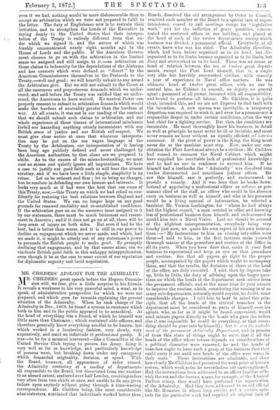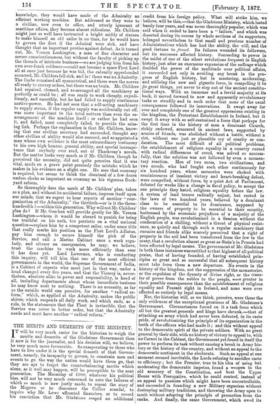MR. CHILDERS' APOLOGY FOR THE ADMIRALTY.
MR. CHILDERS' great speech before the Megmra Commis- sion will, we fear, give a little surprise to his friends. It reveals a weakness in his very powerful mind, a want, so to speak, of administrative perspective for which we were not prepared, and which goes far towards explaining the present situation of the Admiralty. When he took charge of the Admiralty in Dec., 1868, he found a system in existence which both to him and to the public appeared to be anarchical. At the head of everything was a Board, of which he himself was little more than Chairman ; which contained able officers, and therefore generally knew everything needful to be known, but which worked in a lumbering fashion, very slowly, very expensively, and amid an infinitude of professional gossip. It was—to be for a moment irreverent—like a Committee of the United Service Club trying to govern the Army, doing it very well as far as knowledge, and particularly knowledge of persons went, but breaking down under any emergency which demanded originality, decision, or speed. With the Board, however, all appearance of order ceased, the Admiralty consisting of a medley of departments all responsible to the Board, but dissociated from one another to an absurd extent, seattered over half London, receiving orders very often from two chiefs at once, and unable to fix any given failure upon anybody without going through a time-wasting correspondence. Mr. Childers being, like most considerable administrators, convinced that individuals worked better than Boards, dissolved the old arrangement by Order in Council, remitted each member of the Board to a special task of super- intendence, ceased to call meetings except for "legislative work" and for the infliction of grave penalties, concen- trated the scattered offices in one building, and placed at the head of each of the twelve departments among which business was divided, a permanent official. Everybody, at all events, knew who was his chief. The Admiralty therefore, which had been before organized as to its head, but dis- organized as to its limbs, became organized as to its limbs, but dizzy and overworked as to its head. There was no nexus or bond of relation between the ten or twelve great depart- ments, except the First Lord himself, that is, a single very able but horribly overworked civilian, with scarcely a year of experience in Naval office matters. He was ultimate head of twelve great offices, with no one to control him, no Cabinet to consult, no deputy, no general agent ; possessed of all power, invested with all responsibility, and bound to perform all labour. Mr. Childers, it is quite clear, intended this, and we are not disposed to find fault with the intention. A new system was inevitable, a temporary despotism was required to work it, and even for a permanence a responsible despot is, under certain conditions, often the very best chief for a fighting service. But then the conditions are inexorable. He must thoroughly know his business, in detail as well as principle, he must never be ill or invisible, and must never remain an hour without an equally efficient ad interint successor. If the pivot of power is the King, the King must never die or the machine must stop. Now, under our con- stitution the First Lord must always be a civilian ; Mr. Childers had ceased to summon the Naval Cabinet which might have supplied his inevitable lack of professional knowledge ; and he had no one in readiness to succeed him. If he himself had a toothache the " Admiralty " was dissolved into twelve disconnected and sometimes jealous offices. He saw this himself, saw it perfectly, and endeavoured to provide a remedy. And it was here that he broke down. Instead of appointing a professional officer as adlatus or per- manent chief of the staff, an officer who could in his absence carry on business as well as himself, and who in his presence would be a living manual of information, he selected a barrister, Mr. Vernon Lushington, for "whom he had always had the highest regard," a man untried in office and knowing less of professional business than himself, and endeavoured to mould him into a Naval Vizier. Lest we should be accused of the slightest misrepresentation, everybody being very touchy just now, we quote his own report of his own instruc- tions :—" My instructions to him on coming into office were these—I said to him, in the first instance make yourself thorough master of the procedure and routine of the Office in all its parts. When you have done that, make it your first business to superintend and keep an eye on that procedure and routine. See that all papers go right to the proper people, accompanied by the papers which ought to accompany them, and that the results, the decisions of those at the head of the office, are duly executed. I said, then by degrees take up, little by little, the duty of advising upon the larger ques- tions on which the heads of the department seek advice from the permanent officials, and at the same time do your utmost to improve the routine, which, considering the coming-in of so many sub-departments, naturally would require, no doubt, some considerable changes. I told him to bear in mind this prin- ciple, that all the heads of the clerical branches in the department must be considered as parts of himself,—as his agents, who, so far as it might be found convenient, would send minute papers directly to the heads who gave the orders (for it was impossible he could do everything, or that every- thing should be gone into by himself); but lie was the embodi- ment of the permanent Admiralty Department, and in process of time this state of things ought to exist, that if all the heads of the office whose tenure depends on considerations of a political character were removed, he and the heads of branches ought to have such a grasp of the business that they could carry it out until new heads of the office were warm in their seats." Those instructions are admirable, and show how clearly Mr. Childers had perceived the weak point of his own system, which weak point he nevertheless left unstrengthened. Had the instructions been addressed to an officer familiar alike with the sea and the bureau, a man, for example, of the Admiral Tarlton stamp, they would have perfected the organization of the Admiralty. Had they been addressed to an old official like Mr. Romaine, in whom long service and a certain apti- tude for the particular work had supplied all original lack of knowledge, they would have made of the Admiralty an efficient working machine. But addressed as they were to a civilian, new even to office, and utterly ignorant of maritime affairs, they become almost ridiculous. Mr. Childers might just as well have instructed a bright middy of sixteen to make himself an old sailor in no time, for he would have to govern the fleet if the Admiral were sick, and have thought that an important proviso against defeat. As it turned out, Mr. Vernon Lushington, a man of fine character and severe conscientiousness, but without the faculty of picking up the threads of intricate business—we are judging him from his own over-frank evidence—could not become a spare First Lord all at once just because he was bid, the calamity apprehended occurred, Mr. Childers fell sick, and lo ! there was no Admiralty. The limbs remained all symmetrical, and there were the nerves all ready to convey orders, but there was no brain. Mr. Childers had repaired, cleaned, and re-arranged all the machinery as perfectly as could be ; all was ready to work cheaply, expedi- tiously, and smoothly, but he had failed to supply continuous motive-power. He had not seen that a self-acting machinery to supply steam, if the regular supply was accidentally cut off, was more important to the total outturn than even the re- arrangement of the machine itself: or rather he had seen it, and failed, most completely failed, to provide the miss- ing link. Perhaps the explanation is that Mr. Childers, know- ing that one civilian secretary had succeeded, thought any other civilian of ability would also succeed, and so appointed a man whose own evidence is the most extraordinary testimony to his own high honour, general ability, and special incompe- tence that anybody ever read, out of Thackeray's novels. But the matter looks very much as if Mr. Childers, though he perceived the necessity, did not quite perceive that it was vital, made on a grave point precisely the mistake which he makes in his evidence on a slight one. He sees that economy is required, but seems to think the dismissal of a few dozen useless clerks as important an economy as his vigorous Dock- yard reform.
So thoroughly does the merit of Mr. Childers' plan, taken as a plan, and without its accidental failure, impress itself upon our minds, that we regret to hear reports of another "reor- ganization of the Admiralty," the thirtieth—or is it the three- hundredth ?—within this generation. Why will not Mr. Childers' plan do ? If Mr. Goachen will provide gently for Mr. Vernon Lushington—whom it would be absurd to punish for being too truthful on his oath, too patriotic on a vital national question—replace him by a competent sailor, under some title that really marks his position as the First Lord's Adlatus, pay him enough to secure himself the pick of the Service, and call a Marine Cabinet once a week regu- larly, and oftener on emergencies, he may, we believe, trust the machine to work more efficiently than ever it has done yet. Lord Lawrence, who is conducting this inquiry, will tell him that one of the most efficient governments in the world, the Supreme Government of India, is a Cabinet of experts who meet just in that way, under a head changed every five years, and that the Viceroy is, never- theless, absolute alike in power and responsibility, is head of all, including departments about whose immediate business he may know next to nothing. There is no necessity, as far as the outside world can perceive, for another "radical re- form," which, as applied at the Admiralty, makes the public shiver, which suspends all daily work, and which ends, as a rule, in the statements that the Fleet is invincible, that the Service was never in better order, but that the Admiralty needs and must have another "radical reform."







































 Previous page
Previous page